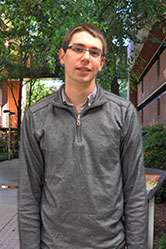Major: Philosophy
“Temporal Logic and Possible Worlds Semantics”

An adequate understanding of the sort of logical structures that underlie everyday talk about time and necessity is required to formally evaluate positions in philosophical debates regarding both the structure of time and the analysis of modal language. I will be studying a number of approaches to formalizing talk about time, in particular examining those fundamental ontological disputes discussed in the classic temporal logic literature and possible applications of some of these concepts to current debates in the metaphysics of modality more generally. Specifically my research will focus on the unique (and fairly radical) temporal logic systems invented and advocated for by Arthur Prior, the metaphysical commitments presupposed in adopting this sort of tensed language, and parallels we may be able to draw to the arguments of those “actualists” in contemporary metaphysical debates regarding the interpretation of possible worlds semantics.
How did you find your mentor for your research project?
I had previously taken a course with Dr. Pfeifer and when I mentioned to Dr. Yalowitz my interest in issues relating to temporal logic, I was pointed in her direction to get an idea of literature I might look at. After meeting with her a few times last fall to discuss some the issues I was interested in researching further, I ended up deciding to spend the last semester surveying a breadth of material in an independent study which formed the foundation of the specific project that will constitute my Undergraduate Research Award (URA) project and my honors thesis for the department.
How did you know this was the project you wanted to do?
Initially I had just set out to get a get a sense of how some temporal logic systems worked technically, having previously been introduced to issues in philosophy of time related to modeling things like causal order given our understanding of special relativity and quantum mechanics (in doing a project for a class taught by Dr. Pfeifer). Once I got into some of the foundational temporal logic literature however, my focus shifted to some of the metaphysical issues more broadly applicable to our understanding of modality generally.
Is this your first independent research project?
I had previously done an independent study with Dr. Yalowitz focusing on issues related phenomenal consciousness and self-reference. Some of this work helped to guide to the specific focus of my current project, as the logical status of indexicals like “now” and “actual” depend on a number of metaphysical assumptions and a very particular understanding of modality.
Do you get course credit for this work?
Yes, this work will constitute my honors project for the philosophy department.
How much time do you put into it?
These were issues that I came to be interested in based on independent reading so much of the groundwork for this project was laid in my free time whenever I had a book in my hand. The award provided me a stipend that then allowed me to cut my hours working over the summer and this semester so that I could dedicate time over the summer to attend a logic workshop at College Park and give myself a few hours every day or so to work on putting together my paper.
What academic background did you have before you applied for the URA?
I was a junior and, at the time of my application, had made it most of the way through my philosophy major and had previously done some independent research.
Was the URA application difficult? How much did your mentor help you?
The application was fairly straightforward. I had put together a pretty technical outline of the ideas I wanted to explore and a tentative thesis; most of what I focused on with the help of Dr. Pfeifer was narrowing my topic down to something manageable and presenting it in particularly clear way.
What has been the hardest part about your research?
(1) Polish notation (2) a vacuum of contemporary literature focusing on on some of Arthur Prior’s more novel ideas
What was the most unexpected thing?
That I would find many-valued logics to be particularly useful.
What is your advice to other students about getting involved in research?
Read contemporary work in your field, get a sense of what questions are still open, talk to faculty and learn what sort of resources are available both on campus and elsewhere to get a sense of where you might go with a project.
What are your career goals?
I am currently preparing to apply for graduate programs in philosophy focusing on metaphysics and logic. I would like the opportunity to continue doing work on these sorts of issues with similarly motivated individuals.
10/24/2014